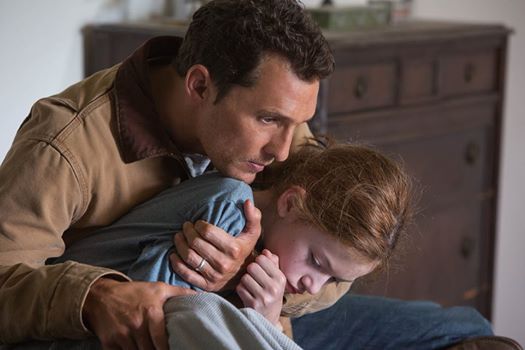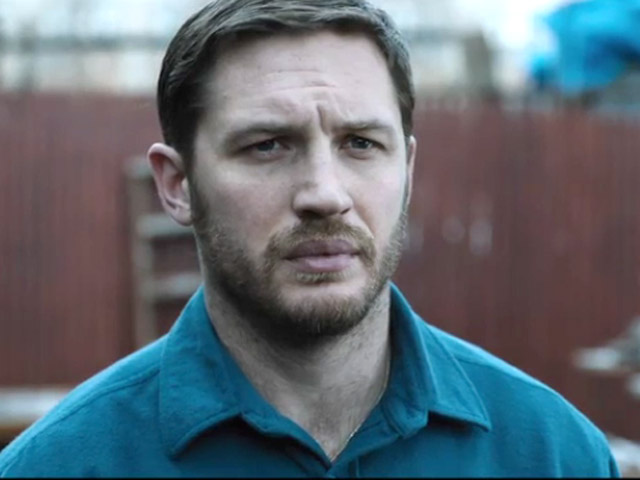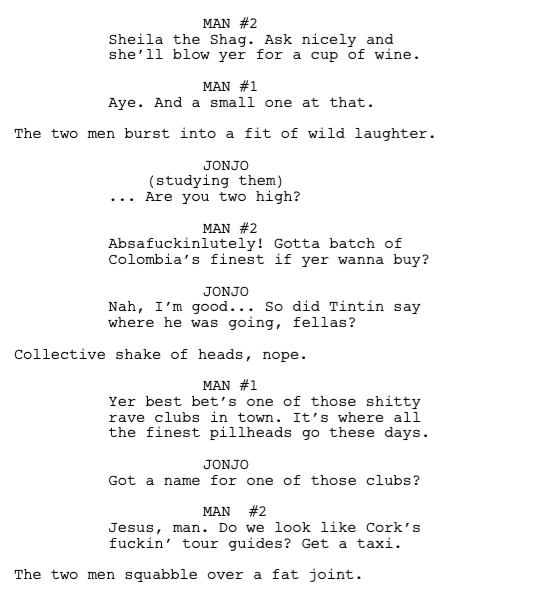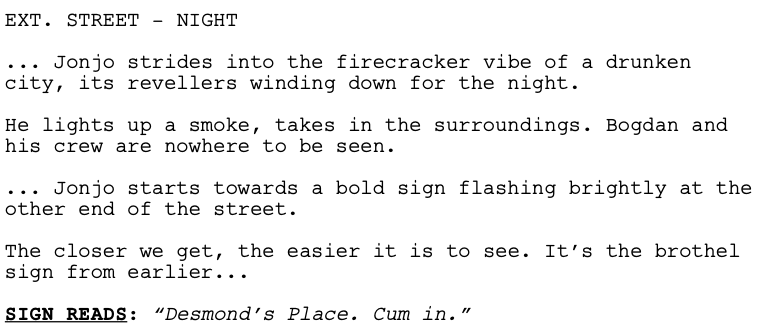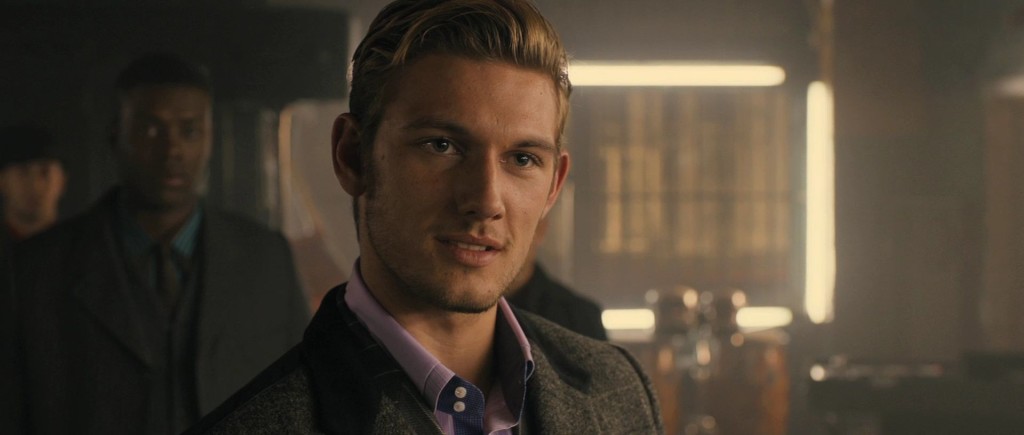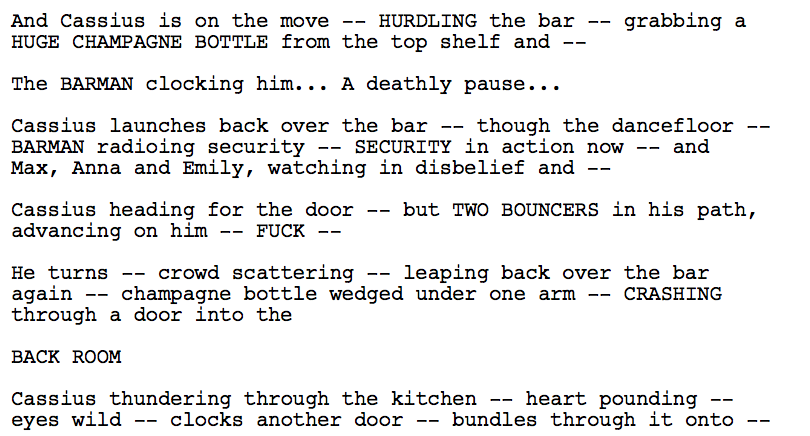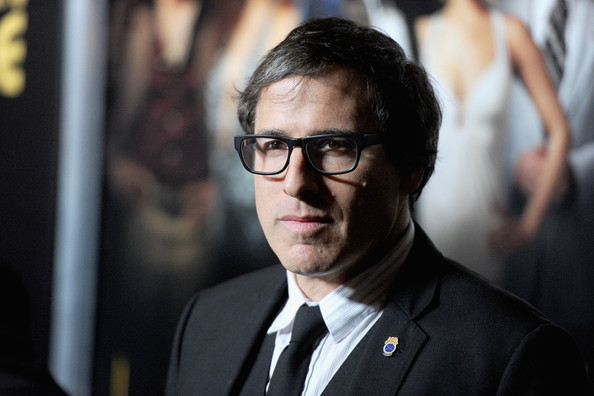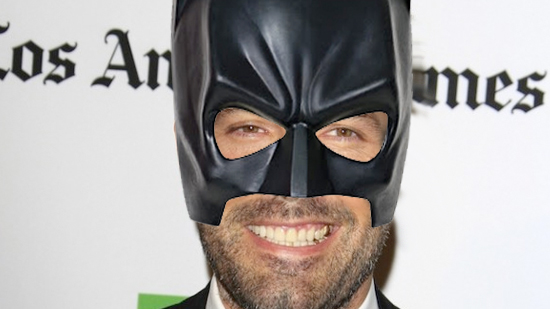Search Results for: the wall
What is the second act? When does it begin? When does it end? I started asking myself these questions after watching this writers roundtable the other day (thank you, commenter who posted this). John Favreau brings up a great point about how the second act is a series of lessons for your main character, and that’s something I’ll get to later on. But just the topic of the second act in general intrigued me, because I think no matter how much you dissect it, the second act is still full of mysteries. It’s like this cave where, every time you think you’ve found the end, there’s another little tunnel that extends even deeper.
Before you can figure anything out about this elusive act, though, you have to know where it begins and where it ends. It begins when your character goes on his journey to pursue his goal. So for those of you who saw Interstellar, that would’ve been when Coop blasts off in his ship on his JOURNEY to find new planets that will save mankind.
The end of the second act is a little trickier to locate. A lot of people will say that it’s when your character is at his lowest point. But I don’t think that’s helpful. It doesn’t give you a concrete destination to take your character. A better definition is probably: when it APPEARS that your main character has FAILED at his goal. Now Interstellar had a whole lot of shit going on, so it’s not the easiest script to decipher when this happened, but I’d probably say the end of the second act is (spoiler) when Matt Damon nearly kills Coop. Either that or when Matt Damon destroys the orbiting ship. In The Hangover, it’d be when they think they’ve found Doug, only to realize it’s not “their” Doug. Time is up. There’s nowhere else to look. They’ve failed at their goal.
Preferably, this “start goal/finish goal” is how you’d approach all your second acts. But as we all know, not every story is this “clean.” Sometimes, the character goal will shift to something else in the middle of the movie (in Aliens, the goal is to go in there and kill the aliens. But when that goes bad, it becomes more about escaping). In other cases, the goal isn’t concrete (American Beauty). And in some movies, there isn’t a goal driving the story at all (When Harry Met Sally). Now I’m not saying that every screenplay has to be goal-oriented, but I will say that the further you move away from that model, the trickier the second act gets. And when you’re talking about something that’s tricky ANYWAY, you can see why so many scripts die here.
To be honest, I wish someone would write a book and just definitively declare the death of the 3-Act structure and make it 4 acts instead. That way you’d have 4 evenly divided sections, making it so much easier to get a handle on your story. In the 4-act scenario, the second act would be the “wind-up” act, where mysteries are being set up and the hero is getting a feel for just how bad the situation is. And the 3rd act would be when the shit really hits the fan. When the big-daddy obstacles are thrown at your hero and when success really starts to come into doubt. The 4th act would then be the rebirth, regroup and charge-in act. To me that’s a lot easier to get my head around.
But even if you have all that stuff in order, there are still certain things you gotta hit in the second act. Obstacles, for example. You want to throw things in the way of your hero so that nothing they do is easy. And remember, it’s hard to throw obstacles at your hero if they don’t have a goal they’re pursuing. Because if there’s no goal, then how do you place something in the way of that goal?
Now here’s where we get to what Favreau was talking about. As much focus is put on properly plotting the second act, the second act is really about character, and more specifically, TESTING YOUR HERO. Let me repeat that. The second act should put your hero through a SERIES OF TESTS. If you’re not testing your hero, you’re not developing your character. And the development of your character is the key to creating an emotional connection with the audience.
To achieve this, you first have to know what your main character’s flaw is. What is it that’s keeping them from being happy, keeping them from being “whole?” This is something your hero may not even be aware of. So for Gravity, Sandra Bullock’s character’s flaw was that she’d given up on life. She’d packed it in. This way, every obstacle that arrived onscreen wasn’t just an excuse to create a fun special effects shot. It was a test of her resolve. To see if she would fight to live or to give in. So the one-two punch of finding a flaw, and then repeatedly testing that flaw, is one that really packs an emotional wallop into the second act, and what builds the bridge for you to care so much in that final act, when the final test arrives.
In addition to this, the second act is about keeping things fresh. Most of the bad second acts I read – and I read a lot – make one critical mistake. They keep giving you the same thing. For example, I recently read a romantic comedy where the main character was pursuing a girl. The second act consisted of scene after scene of him trying to win over this girl. They were all the same scenes. Sure, the locations were different, but the make-up of each of these scenes was the same.
You solve this by BUILDING your second act. And to properly build, you need to do two things. Each major plot point must feel bigger than the previous one. And each major plot point must have HIGHER STAKES than the previous one. There will be some ebb and flow in the valleys between the major plot points. But the plot points themselves must feel bigger as they go on. Early in the second act of Star Wars, Luke and Obi-Wan need to find a pilot. The stakes are pretty high cause of this R2-D2 fellow. Later in the second act, they’re trying to escape from the Death Star with the Princess. A bigger plot point with higher stakes.
But just building isn’t enough. The second act is such a huge chasm of never-ending space that you have to surprise your audience every once in awhile, or else they get bored. You can do this with a surprising mid-point twist (in Gone Girl – spoiler – this is when we find out that Amy has been conning Nick), you can have your hero unexpectedly achieve his goal (he finds the killer!) only to announce a new goal soon after (it turns out they were after the wrong guy all along – the real killer’s still out there!). Or just throw in a fun surprise or three, something the audience isn’t expecting.
Keep in mind that it’s really hard to do any of this without a plan in place. And this is where you usually see the difference between amateurs and pros. Amateurs will try and wing the second act. They’ll try to come up with all these things on the fly, not realizing just how long the act is, usually resulting in them running out of steam (almost always around page 50).
Pros know that the second act is like a 100 day hike up the Pacific Coast Trail. If they don’t chart how much food and water they need, when they’re going to reach re-supply stations, or forget crucial tools they need to survive, they’re probably going to die. So as much as some of you hate to hear this, one of the biggest keys to surviving the second act is outlining. It’s a portion of the script that’s screaming out for a plan. And while I’m not saying you non-outliners can’t be one of the lucky ones who emerges at the finish line unscathed, it’s a lot more likely that you’ll die a drawn out agonizing death. ☺
I’d love to hear your own experiences with second acts and what helps you guys get through them. The more we can help each other out, the better we all get.
Get Your Script Reviewed On Scriptshadow!: To submit your script for an Amateur Review, send in a PDF of your script, along with the title, genre, logline, and finally, something interesting about yourself and/or your script that you’d like us to post along with the script if reviewed. Use my submission address please: Carsonreeves3@gmail.com. Remember that your script will be posted. If you’re nervous about the effects of a bad review, feel free to use an alias name and/or title. It’s a good idea to resubmit every couple of weeks so your submission stays near the top.
Genre: Crime-Thriller
Premise (from writer): Over the course of one night, a reformed father must step back into his murky past to find his criminal brother who is the only suitable donor for his dying son…
Why You Should Read (from writer): I think it was Tarantino that said he’d been staring through the window at the industry for so long prior to Reservoir Dogs’ success that it felt normal for him to be on the outside now. At times I very much feel the same. I’ve had the agents, the managers, the lawyers and done the water bottle tour too. I’ve had scripts go out to all the major studios and prod cos and placed highly or won most of the major contests worth entering. I’ve written/directed my own award winning short films that allowed me to go around the world to various festivals and meet audiences first hand, and I’ve had pilots go into networks and yet I’m still here bashing away, whilst staring through that looking glass and working as a bartender. So, I decided to take stock, go away and write something that I’d want to see at the cinema. A movie me and my buddies would find cool. It’s taken me 13 feature scripts and 4 pilots to “find my voice” and I’m keen to show it to a script writing community that’s as passionate about writing great stories as I am. This is REBEL CITY – with echoes of Michael Mann’s Thief and The Friends of Eddie Coyle – it’s a neo noir crime flick… Hope you like it as much as I enjoyed writing it.
Writer: Chris Ryden
Details: 114 pages
Man, I hadn’t read the “Why You Should Read” until just now. That shows how hard this business is. Chris has already made a ton of headway in his career, and yet he’s still, as he points out, “bashing away.”
After reading Rebel City, I know why he’s made it as far as he has. Chris can fucking write. Not only does he have all the technical stuff down (very sparse description, clean easy-to-read writing, characters that pop off the page as soon as they’re introduced, gets to the point quickly in scenes) but this just feels like a movie when you read it.
One of the things I love, as a reader, is when I go into something with expectations, and those expectations are immediately turned on their head. Like when I see “Crime” as the genre, 9 out of 10 times I know we’re going to start in some restaurant (or bar, or club) with a bunch of “tough guys” (cops or thugs) talking “tough guy speak.” The restaurant will always be over-described, giving the first page wall-of-text ebola. We’ll then listen in on the tough-guy speak, only to realize by the second page that there’s no point to the scene other than for the writer to be able to write this dialogue – dialogue, mind you, that is 95% clichéd.
In Rebel City, we start with a black screen and a phone call. The discussion is quick and to the point. “Where the fuck are you, Seamus?” “Your flight landed four hours ago.” “Wasn’t on it.” “I didn’t hear that.” “I’ll come get you.”
Not only do we start unexpectedly. But we start with PURPOSE. The words coming out of the characters’ mouths actually MEAN something. A story is being presented. In the very first scene! That’s how you catch a reader’s attention.
And that’s how Rebel City opens. Jonjo, a former criminal who used to live in the small dirty city of Cork, has to go back there to pick up his derelict brother, Seamus. You see, Jonjo’s 7 year old son is dying. Seamus is the only kidney match for him. But Seamus is a wreck. He’s already missed half a dozen plane flights back here with various excuses, and somehow Jonjo knows that if he doesn’t get him now, he might never get him.
So back to Cork Jonjo flies, thinking he’ll just show up at his old house and there Seamus will be. Except it’s never that easy with Seamus. Instead of his brother, Jonjo runs into three thugs who rough him up, telling him he needs to give Seamus a message. They want Florenta back, whoever the fuck that is.
Jonjo then heads to his sister’s place, who he hasn’t seen in years, and she wants nothing to do with him ON TOP of not knowing where Seamus is. Jonjo realizes that if he’s going to find Seamus, he’s going to have to go back inside the grisly underworld he worked so hard to escape. He’s going to have to be Bad Jonjo again.
So then, in the spirit of The Equalizer and John Wick (“That dog was a dying gift from my wife!”), that’s exactly where Jonjo heads. He meets some old friends and makes some new ones (if “making new friends” includes being shot at, tied up, and tortured). The longer he looks for Seamus, the more he realizes his brother’s involved in some deep shit, the kind of shit where even if he finds him, there’s no guarantee they’re going to get out of this town alive. But Jonjo’s son takes precedence over everything. If there’s any chance of getting his brother, he’s going to take it.
It’s hard to read Rebel City and not marvel at the skill on display here, particularly the dialogue, which is something we don’t get to celebrate enough on the site. Chris keeps his dialogue short and to the point so it zings by, knows his characters well enough that each one sounds a little different, and gives each line a touch of salad dressing to elevate it above regular conversation.
And his description isn’t too shabby either. Chris never lingers, never over-describes, but adds just enough flavor to paint a picture.
You’re probably sensing from my tone that there’s a “but” coming. And there is. But there’s something that didn’t click here for me. And this is one of the most frustrating parts of my job. It’s kind of like being a music producer. You have a singer come in and they have an AMAZING voice. It fucking blows you away. Then later you pop in a song of theirs and the song is ho-hum. You still hear that amazing voice, but the song isn’t doing it for you.
I think my reservations are due, in part, to me hoping the script would go in another direction. I thought Jonjo was going to pick up the world’s shittiest brother, Seamus, and the two would have to navigate themselves out of the town. Cause to me, Seamus was the most interesting character in the screenplay. He’s this piece of shit who has the opportunity to save his own nephew, and yet he can’t fucking get on a plane with a ticket already bought and paid for. I wanted to know more about what made that guy tick. And I wanted to see that sibling relationship play out over the course of the movie.
But after 20 pages, I realized that Seamus was a plot device only. He exists only to get Jonjo there, which means Jonjo’s going to be doing this alone. And don’t get me wrong. There are still some nice moments. Hell, I think the Peg-Leg Pete Dominatrix scene (page 65 for those who want to jump straight to it) should go down in the annals of Amateur Friday history. That was some fun/hilarious/disturbing shit.
But a lot of the other conversations and scenes felt too familiar. Just like those singers who can knock a high note out of the park, Chris had a stranglehold on these characters and they all sounded wonderful. Still, the song wasn’t making me dance. If you’ve asked one low-rent punk where Seamus is, you’ve asked them all.
So if I were Chris, I’d embrace the absurdity of this world. Just like the Peg Leg Pete scene and, to a lesser extent, the Evelyn scene (I feel like we cut out of that scene before things could get good), you make this a cast of characters that are over-the-top and fucking weird. Each one moreso than the last. The further this journey goes on, the stranger it gets. Because, yeah, the Cunninghams were okay as a gang, but they were far from MEMORABLE. I want memorable.
Also, and keep in mind this is coming from a sci-fi geek, I thought the mystery government high-tech box thing should have played a much bigger part in the story. That was the first moment where I went, “Whoa, what the hell is Seamus involved in here?” There was finally some real mystery to the story. But as soon as it’s mentioned, it goes back into hibernation. I would’ve loved for that to arrive earlier and be a bigger part of the plot.
The way I see this is we’ve already seen the standard version of this movie. The thug underbelly English/Irish life. So what are you going to do to make your “thug underbelly English/Irish life movie” different? How do you make yours stand out? I say you do it by putting more crazy into these characters. I understand this changes the tone of the movie significantly, and if that’s not the movie you want to write, don’t write it just because I think you should. But that was my problem with the script. It felt too familiar.
Script link: Rebel City
[ ] what the hell did I just read?
[x] wasn’t for me
[ ] worth the read
[ ] impressive
[ ] genius
What I learned: It’s no secret that I believe opening scenes are the most important scenes in the script. They’re the scenes where you either hook the reader or lose them. So here’s a strategy for writing them. Whatever TYPE of movie you’re writing (genre plus concept) ask yourself, what’s the most likely opening scene for that kind of movie. For example, if you’re writing a Western, the most likely opening scene might be a duel in the middle of town. Then, write something COMPLETELY DIFFERENT FROM THAT. Just write something they aren’t expecting. Because if you can defy your reader’s expectations on the VERY FIRST PAGE, they’re going to trust you as a writer. They’re going to believe you can keep doing that over and over again.
Get Your Script Reviewed On Scriptshadow!: To submit your script for an Amateur Review, send in a PDF of your script, along with the title, genre, logline, and finally, something interesting about yourself and/or your script that you’d like us to post along with the script if reviewed. Use my submission address please: Carsonreeves3@gmail.com. Remember that your script will be posted. If you’re nervous about the effects of a bad review, feel free to use an alias name and/or title. It’s a good idea to resubmit every couple of weeks so your submission stays near the top.
Genre: Crime/Drama
Premise (from writer): Having been kidnapped in South Africa, a resilient young traveller is forced into criminal activity by his captors in order to repay the ransom his family could not afford.
Why You Should Read (from writer): I got notes for this [from Carson] about a year or two back. Following some rewrites, it’s had a couple of producers on and off the project, getting closer each time. I’m looking to find out why this script hasn’t gone beyond getting interest into getting made.
Writer: Ned Kilgannon
Details: 112 pages
Today’s writer, Ned, asks a great question. A question that thousands of Hollywood insiders and outsiders ask all the time. Why hasn’t my project, which has gotten interest from a lot of people, been able to take that next step and get made?
It’s a frustrating question for people particularly because they see so many bad movies getting made. And then they have their project, which they think is pretty darn good, and for some reason it can’t cross the finish line.
Well, I have some theories about this, which I’ll be glad to share in a second. But before I do that, let’s take a look at the script at the center of our question… Devil In You.
22 year-old Cassius Ramsey is just another spoiled rich kid who’s got money to burn. He chooses to use that money to roam the earth while he figures out what to do with his life. His travel partner, Max, may not have the same deep pockets as Cassius, but he’s got the same spirit for adventure.
Somewhat bored with the typical touristy places kids travel to, the duo decide to check out South Africa, thinking they’ll have a more “original” experience. But as soon as they land, they notice some sketchy men targeting them. Then, on the bus ride out of the airport, they’re stopped and kidnapped by a ruthless gang of criminals.
When the criminals find out Max’s family is penniless, they kill him. But the criminals’ kidnapping-for-cash job doesn’t go as planned when Cassius’s estranged father tells the kidnappers to fuck off. Facing death himself, Cassius pleads with the crew to let him join them. He promises he’ll pull his weight.
The intimidating but pragmatic leader, Jacques, gives Cassius a test to rob a local woman, and he passes with flying colors. Soon, Cassius finds himself moving up the gang’s ladder as he excels at every job and continues to impress Jacques. There’s something exciting about this life that plays to Cassius’s sense-of-adventure. But at a certain point, he starts to yearn for home again, and ultimately must decide whether he wants this life, or his old one.
Before I can answer Ned’s question, I first want to provide what, in my opinion, are the four types of ways movies get made.
The first tier are the sure-things. These are the projects that are so good, either through concept or execution, that nothing can stop them from getting made. These are the Jurassic Parks, the Hangovers, the Transformers, the American Beautys. Everyone knew these movies were going to get made as soon as they heard the concept or read the script. These projects are forces of nature. Nothing can stop them.
The second tier are the studio mandated movies, the ones that are created solely because the studio believes they’ll make money. These are typically spearheaded by producers who don’t really care about the quality of movies so much as what they do to their bottom-line, and the results reflect that. Sometimes you get your Sex Tapes and sometimes you get your Snow White and the Huntsmans. Somteimes you get your Blendeds and sometimes you get your Lego Movies.
The third tier are the writer-directors out there who have the power to make films just on their name. This is actually where a lot of the bad movies – the ones where you wonder “How the hell did that get made?” – come from. There are no checks and balances on these scripts since the writer-director can make whatever they want. And while sometimes that can be a good thing. Other times it can be a disaster. Sofia Coppola’s “Somewhere.” Jason Reitman’s “Labor Day.” These are Tier 3 films.
The fourth and final tier is where everyone else lives. The rest of the projects get made through good old fashioned passion. Because think about it. Nobody wants to make any movies outside of the first three tiers. Therefore, the only way to get a movie made is if you cheerlead your project into existence, if you send it out to everyone, if you push it through wall after wall, if you pester anyone you know to read it, no matter how uncomfortable that pestering becomes.
A movie like The King’s Speech is a perfect example. Nobody wanted to make that movie. Seidler sent it everywhere. Thinking Geoffrey Rush would be the perfect actor for the part of the teacher, he went through his agent. The agent told him to fuck off, that Rush would never have any interest in the part. So Seidler actually found out where Rush lived and sent it there. Rush read it and loved it. Seidler’s passion for his material got the movie made.
Here’s the thing with passion though. People don’t get passionate about shit. You can try using a bunch of smoke and mirrors but if your script’s bad, no amount of cheerleading’s going to get you followers. So having success in the fourth tier usually dictates a minimum amount of quality. The higher the quality your script is, then, the more likely your passion will catch on with others, and the easier it will be to get your script through the system.
Which brings us back to Devil In You. Devil in You, I believe, meets the minimum level of quality required for a Tier 4 project. It’s a solid script, in the vein of movies like Goodfellas and The Godfather, about a guy moving up inside a crime organization, with a unique spin in that it’s set in South Africa and has an unlikely hero.
So why isn’t it a sure thing yet? My feeling is that it’s not big enough. If you look at films like The Godfather and Goodfellas, you got the feeling that our characters were moving up higher and higher into a bigger and bigger world. Just the other day I was talking about how you never want the word “small” in your logline. Nobody makes a movie about “small.” And yet that’s how this feels to me. It’s a relatively small gang and it never grows. With some minor exceptions near the end, I never felt like the crimes they pulled got any bigger, any badder. Cassius definitely moves up within the gang, but I’m not sure that matters if the gang’s influence within the community itself doesn’t grow.
Also, I didn’t really know where the script was going. It didn’t seem to be driving towards that big climax. Again, it felt stagnant, like the gang was just going from one average robbery to the next. For example, your typical heist movie will have the “big last heist.” So we have something to look forward to. Or if you don’t have that, then you at least have to have the feeling that things are getting bigger and that they’re coming to a head. Like I was saying the other day, you need to feel like the balloon’s blowing up. I’m not sure I ever felt that here.
So if I were advising Ned on this particular project – helping him find a way to get this made, I’d tell him to think bigger. Have this gang grow more with each robbery. Just like all these crime movies, show Cassius move his way up the ladder until he’s a serious badass. I guess that’s another problem I had. I never saw Cassius as anything other than that traveller. I never saw him truly lose himself in this world. And I think that’s because Ned was constantly pumping the breaks.
As far as some personal opinions, I’d make Jessica Jacque’s girlfriend, and have her and Cassius have to sneak around. I’d also ditch the Robin Hood stuff. If we’re going to make these guys bad, let’s make them bad. Let’s have Cassius truly have to cross over into a brutal world. True, the Robin Hood stuff makes Jacques and his outfit more interesting, but I think it limits the gang in how far they can go. That’s how I’d attack it if I were him.
So to summarize, the less impressive the script is, the more passion will be needed to get it made. You can either try to supply that passion yourself and be the biggest cheerleader in the world, or you can get back to work on the script and let it do the work for you. I think Ned’s a really good writer. I just think this script needs to feel bigger. It needs to build more. What do you guys think?
Script link: Devil In You
[ ] what the hell did I just read?
[x] wasn’t for me
[ ] worth the read
[ ] impressive
[ ] genius
What I learned 1: It’s hard to cast 20-somethings (especially early 20-somethings) to carry a movie. Studios are reluctant to do it unless it’s a high school or college film. It’s not that it’s never done, but in genres like crime, they typically like someone older.
What I learned 2: You want to make your writing easy on the eyes. You want to make it a pleasing read. The excessive use of dashes and capitals made for a harder read than usual here. As someone who had just read two really easy-to-read scripts, this stuck out. Here’s a sample of what I mean. This hurt my eyes.
Genre: TV Pilot (Drama)
Premise: An “upstairs/downstairs” look at the daily activities that plague one of the most exclusive country clubs in the country.
About: This is a project David O Russell (American Hustle, Silver Linings Playbook) was spearheading with Susannah Grant (Erin Brokovich, Party of Five). Apparently the two went their separate ways over creative differences. But Grant is still pushing forward with it and the show will premier in 2015 on ABC. This is the last draft the two wrote together (for those looking around the net for this file, it goes by the name “ABC – Untitled David O Russell – Susannah Grant Proj”).
Writers: Story by Susannah Grant and David O. Russell – Teleplay by Susannah Grant
Details: January 13, 2014 draft (63 pages)
Maybe the British readers can help me out here. Why is it that this whole “upstairs/downstairs” thing, which is being explored most famously in the show “Downton Abbey, is such an obsession with you? Why do these rich/poor mingling-in-the-same-place explorations fascinate you so much?
I have a British actor friend who moved here and I asked him once why he decided to do so. He said that in the UK, it’s a lot harder to break out of your class. Whatever you’re born into, that’s who you’ll be the rest of your life. Whereas in America, nobody cares about that shit. So he’d much rather take his chances here.
I couldn’t believe what I was hearing. Could it be true? One of the most distinguished nations in the world is still running a class system?? What is this? 1709?
I suppose that this would explain the fascination with these types of stories. If there is a class system still in place, the conflict that arises between the “haves” and the “have nots” is interesting, since the characters are locked into those slots. The question is, does that setup intrigue an American audience who’s never had a class system before? Where it’s not as “risqué” for a staff member to cavort with a club member? Let us discover the answer together.
Members Only focuses on an upscale country club that caters to the “best of the best of the best.” The club was built by and is run by the Holbrooke family. The face of the club, and the de facto manager, is Mickey Holbrooke, a 40 year old beauty married to a hotshot Wall Street tycoon named Randy.
As you’d expect, the second Mickey walks into the club to begin our journey, there’s drama. The club is in huge debt, and it’s forcing the board to get creative. They want to hold a professional golf tournament here but they don’t think the tournament will agree because “we have no black people.” So the first order of business is to go out and find a black family to become members of the club.
Meanwhile, we meet Jesse, a kid from the projects who got this job by the skin of his teeth. He’s a new staffer and has been told that if he even looks at someone the wrong way, he can be fired. So you can imagine the torment he goes through when Mickey’s hot horny 17 year old triplets start a game of who can nail the Jesse first.
In the meantime, we meet TONS of other people. There’s Forty, a Holbrooke who just got out of jail for his 3rd DUI. There’s Ava, the cool as can be “I don’t give a fuck” staffer with a propensity for stealing. There’s Malcolm, the hot widowed husband who every housewife wants to bang. There’s Leslie Holbrooke, whose husband dumped her for, get this, her step-mother – a trophy wife to her alcoholic Senator father.
But the story doesn’t really get good until the midpoint. Two agents from the SEC corner Mickey and inform her that her husband is the biggest financial thief since Bernie Madoff. They’re going to take him down in two days. If Mickey helps them, they may be able to protect Mickey, her daughters, and the club. But if not, all bets are off. The duo kindly hand Mickey their card. If she doesn’t respond in 48 hours, they’re making their move. And just like that, Mickey’s life is turned upside-down.
Members Only may be the most jam-packed pilot I’ve ever read. There were 30 characters in this thing. That’s one character introduced every two pages. On top of that, a TON of shit happens. Thefts, cheating, ménage-et-trois’s, death, embezzlement, a golf tournament, a party, several courtings, racism, sexism. I mean, wow. Grant and Russell need an award just for fitting this much stuff into a script.
And actually, the more I thought about it, the more I realized this “jam it all in” approach would work as a screenwriting exercise. You’re always taught to get through your scenes as quickly as possible, but that’s easier said than done. Well, when you write a pilot (60 pages) with so many characters and so many plotlines, you have NO CHOICE but to write scenes quickly. The average scene here was a page and a half. Having to get in and out of a scene that quickly and still keep it compelling? That’s a skill every screenwriter should have.
For example, in a scene where Mickey must call and convince the tournament sponsor to consider their club for the professional tournament, the scene starts with Mickey already on the phone mid-conversation. That’s how we get through scenes quicker. If you start with all the “Hi, this is Mickey calling from blah blah blah,” and the forthcoming formalities, you’re taking a looooooot longer than you need to. Start us midway through the conversation to cut down time.
The problem with Members Only is that despite its best efforts, you can only maneuver through so much plot when you’re introducing 30 people, and for the first half of the screenplay, while I was admiring the work, I wasn’t fully engaged in the story. And I was wondering why. Then it hit me.
Suspense!
There wasn’t enough of it. Meeting people, meeting people, meeting people, is not suspense. It’s meeting people. I mean, there’s a little bit of suspense in whether they’re going to get the tournament to play at their club, but it’s not enough to hook us for 30 pages.
Suspense can’t be treated like a blanket tool. There are variations in its intensity, and if you’re not going to give us suspense with a high level of intensity, our focus is going to wander. In this case, the Defcon 5 suspense plot point didn’t hit until the midpoint – this is when Mickey’s told that her husband’s embezzled hundreds of millions of dollars.
From this point on, the suspense is VERY high because we’re DYING to see Mickey confront her husband. We have to know what she’s going to say and how he’s going to respond. So anything you write between the beginning of this suspense thread and the conclusion of it is golden. We’re zoned into your story until that line of suspense is over.
And that’s exactly what Grant and Russell did. They drew it all the way out, not even telling us at the end of the episode. Which means we’ll have to tune in next week to find out! Suspense is the cornerstone of any good piece of fiction, but it’s especially important in TV where you’re repeatedly asking your viewers to come back after commercials and come back week after week.
Still, the intensity in which I became attached to the story after that suspenseful plot point makes you wonder: why not start the script with a suspenseful plot point as well? Something big and flashy to keep us riveted through all the character introductions? The more I think about it, the more I believe that every stretch of your screenplay should have a suspense thread going on. At LEAST one.
Members Only is a good teleplay but its success is going to depend on how it’s shot. Will it be shot in that dark serious tone that Downton Abbey is shot in? Or will it be treated like the glossy vapid Revenge? Being that it’s an ABC show, it’ll probably be more like Revenge, which would suck. Now is the time for the networks to start challenging the cable channels with riskier fare. If this show has any shot at lasting, it needs to go darker. I just don’t know if ABC is capable of that.
[ ] what the hell did I just read?
[ ] wasn’t for me
[x] worth the read
[ ] impressive
[ ] genius
What I learned: “And” is a great place to start in a scene. It means we’re coming in on a character in the middle of a conversation. Which means a shorter scene. Which means you’re only showing the good stuff. During the scene where Mickey is on the phone trying to convince the tournament to play at the club, we come in on this line: “And I’ve been a huge fan of your tournament for ages, so this could be a match made in heaven! Excellent! Yes! See you then.” – “And” is a great place to start. But really, the goal is to start anywhere mid-conversation.
So today I read the news that Ben Affleck is thinking about making The Accountant his next project. “The Accountant”?? I wondered, my face pinching up, trying to remember why that sounded familiar. Off I went to my review archives and LO AND BEHOLD, I’d reviewed it! But that’s impossible, I thought. I would’ve remembered it, right? Yet I was drawing a size-10 blank.
But once I skimmed through the review, it all came back to me. The awfulness. The sloppiness. I remember actually thinking at one point that I’d been duped. That’s happened a few times, where I hear about a script, go looking for it, find it, it turns out to be unreadable, then I later learn I’ve read an amateur script with the same title.
So then why was Ben Affleck doing the movie??? Take whatever you think of Affleck as an actor out of the equation. The guy is the hottest thing since sliced bread at the moment. Which means he gets all the best scripts in town. He gets his pick of the litter. So for him to literally choose “litter” to star in was confounding.
Until you look deeper. You see, the main character in The Accountant is autistic. And this is the screenwriting secret that so many writers either ignore or are ignorant to. Outside of the summer tentpoles, actors make a movie go. They lead to financing which leads to a green light. Which logically means that to get a movie made, you have to write a great character that an actor will want to play.
In fact, for 90% of the actors out there, the role they play is more important to them than the script itself. They want to play a part that’s challenging, that’s interesting, that’s going to get them some acting credit. When you look at it that way, it’s not so ridiculous that Affleck would choose this script. He wants to play an autistic hitman. He’ll either fix the rest of the script himself or hire Chris Terrio to do it. But dammit if he’s not going to play that autistic hitman.
This brought me to a realization that I’ve already had several times before, but for whatever reason, didn’t become crystal clear until today’s events. Unless you’re writing a huge summer flick, you need to put more emphasis on the character at the center of your story than the story itself. Cause that’s what the actors are going to do.
Which leads us to today’s article. I’m listing the top 17 “challenging” character-types that actors want to play. If you can fit these into your story in a natural way, you’ll want to consider it. ‘Cause I guarantee you this: If your main character is bland, no A-list actor is going to make your movie.
Autism – Why not start with Affleck’s new love? The disorder did wonders for Dustin Hoffman with his role in Rain Man. Because acting is, in many ways, about emoting, there’s something appealing about a character who does the complete opposite.
Psychopathic – Being a psychopath isn’t just about murdering. It’s about playing anti-social and non-empathetic behavior. Its appeal is that it’s another condition that goes against how we normally act in life. Inevitably, these characters tend to become killers (American Psycho, Monster, Taxi Driver) but it’s all the other tics that get the actors excited.
Going Crazy – Aw man, talk about actor catnip. Write in a character who’s going nuts and watch the A-listers line up, as “going crazy” often leads to an Oscar nomination. A Beautiful Mind, The Aviator, The Shining. These characters are fun to write as well, so it’s an actor-writer match made in heaven.
Robots – Bringing sci-fi into a venue where we’re looking for meaty rolls seems counter-intuitive. But much like playing a psychopath or a sociopath (the psychopath’s little cousin), playing a robot forces you to strip away all your emotions, a challenging feat. We’ve seen great robot characters in the Alien movies, as well as 2001.
The Genius Paradox – Talk about the perfect part to play to actors’ egos! A genius character! We saw it recently with Lucy. Before that, Limitless. As we saw in my recent review, “Brilliance” will be coming to the big screen soon. Thrusting genius into your lead character is a surefire way to get some actor attention.
OCD – OCD got Jack Nicholson one of his Oscars (in As Good As It Gets). We just saw it to a lesser degree with Robert McCall in The Equalizer. They even based an entire show around OCD once (Monk).
Addicts – Many actors have demons. And playing addicted characters allows them to explore and battle those demons, if only for a few months. From Flight to Leaving Las Vegas to Half-Nelson, playing a convincing addict seems to be a badge of honor for actors.
Mentally Challenged – This has been made fun of plenty of times before, most notably in “Tropic Thunder,” but what can you say? Actors love the challenge of playing someone who’s mentally challenged. Forrest Gump. I Am Sam. I mean, if you can pull this off, you’re basically guaranteed an Oscar.
Twins – Imagine you’re an actor and you get the opportunity to play not just one role in a movie, but two? Two completely different characters. What actor isn’t going to take that into consideration? Check out The Prestige or The Social Network to see this in action.
Body-Swappers – Looked down upon by some for being gimmicky, a body swapping movie allows actors to play two roles which are usually polar opposites. We saw it with Face-Off. We saw it in The Change-Up. But don’t limit yourself. I think it’s only a matter of a time before someone comes up with a clever body-swapping drama idea.
Amnesia – Amnesia gets a bad rap for being cliché, but don’t tell actors that. They love playing people who can’t remember jack shit about who they are. That’s a hell of a challenge. Bourne built an entire franchise off this conceit.
Pathological Liars – A character whose every day survival depends on lying can be fascinating for an actor to play (and for an audience to watch!). We saw William Macy do it in Fargo, and Hayden Christensen nail it in Shattered Glass.
Self-destructive – This is usually tied in with addiction, but can exist on its own as well. Some of the most tragic characters in our history did themselves in due to being self-destructive. Most recently, we watched this play out in Wolf of Wall Street.
Depression – Depression is sad. But it sure makes actors happy. Punch Drunk Love, Revolutionary Road, Silver Linings Playbook, Little Miss Sunshine. It’s a clever way to lure in comedy actors hoping to play against type (Skeleton Twins).
Any extreme limitation (blindness, wheelchair-bound, deaf, cancer) – The Book of Eli. Sea of Love. Born on the Fourth of July. The Fault In Our Stars. Dallas Buyers Club. It goes without saying that actors love to play these roles where they’ve been handed an impossible limitation.
Discriminated Against – One of the greatest 1-2 punches for drama is to set a movie in a time where a subset of people are being heavily discriminated against, then make your main character one of those people. A black man in the 1960s. A gay man in the 1950s. A Jewish man in Germany in the 1940s. You’ll have to fight actors off from taking these roles.
Get creative – Look for any way to create a challenging lead role in your script. Benjamin Button got made because Brad Pitt got to play every age in life, from a newborn to an old man. In the Black List script, What Happened to Monday, an actor will get to play septuplets! I seem to remember a movie awhile back that centered around a Jewish Nazi. Create something that, at its core, is challenging. These are the roles actors are drawn to.
Now there are a couple of caveats to this business. The character you’re writing has to fit into the story you’re telling. A meth-addict protagonist may increase interest from actors, but it’s not going to work if you’re writing a romantic comedy produced by Mark Burnett. In other words, don’t slap a fancy character into any old idea and expect miracles. The two must co-exist organically.
Also, none of these suggestions will work unless you convey them in a truthful manner. In other words, research the shit out of them so that you know what you’re talking about. If you try to write an autistic lead and all you know about autism is what you’ve seen in movies, I guarantee you the character’s going to suck. Do tons of research and find out what everyday life is like for these people. The more you know, the more convincing they’ll be, the more likely an actor will be attracted to them.
And, as always, take these suggestions as a starting point. They won’t work on their own. They need your own personal spin to pop. A great way to do this is through irony. Make a sex addict the new church pastor. Make your protag, who suffers from depression, a Barney-like character on a new kid’s show. I hope that helps.
What do you guys think? Anything I should add to the list?

